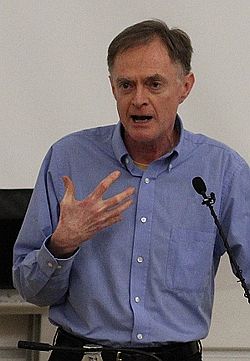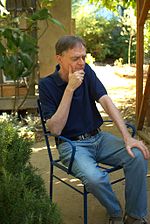Richard Heinberg - Wikipedia, the free encyclopedia
Richard Heinberg
From Wikipedia, the free encyclopedia
| Richard Heinberg | |
|---|---|

Heinberg discussing energy at University of Toronto, March 2013
| |
| Born | 1950 |
| Occupation | Writer, educator, environmentalist |
| Language | English |
| Nationality | USA |
| Ethnicity | USA |
| Genre | non-fiction |
| Subject | peak oil, resource depletion, sustainability |
| Notable works |
The Party's Over: Oil, War, and the Fate of Industrial Societies Powerdown: Options and Actions for a Post-Carbon World
The End of Growth: Adapting to Our New Economic Reality |
| Spouse | Janet Barocco |
| Website | |
| www | |
Richard Heinberg (born 1950) is anAmerican journalist and educator who has written extensively on energy, economic, andecological issues, including oil depletion. He is the author of thirteen books. He serves as the senior fellow at the Post Carbon Institute.
Contents
[hide]Career
Heinberg, after two years in college and a period of personal study, became personal assistant to Immanuel Velikovsky in November 1979 and after Velikovsky's death assisted Mrs. Velikovsky editing manuscripts.[1][2] He published his first book in 1989, Memories and Visions of Paradise: Exploring the Universal Myth of a Lost Golden Age,[3] which was the result of ten years of study of worldmythology. An expanded second edition was published in 1995.[4] He began publishing his alternative newsletter, the MuseLetter, in 1992. His next book was published in 1993:Celebrate the Solstice: Honoring the Earth's Seasonal Rhythms through Festival and Ceremony.[5]
In June 1995, speaking to the International Society for the Comparative Study of Civilizations in Dayton, Ohio, Heinberg provided "A Primitivist Critique of Civilization" and discussed the ways in which "We are, it would seem, killing the planet."[6]
His books from the later 1990s address the relationships between humanity and the natural world. In 1998, he began teaching atNew College of California. in the "Culture, Ecology and Sustainable Community" program, which he helped design. He remained a member of the Core Faculty until 2007, when the College closed its doors.
In 2003, Heinberg published The Party's Over: Oil, War, and the Fate of Industrial Societies, one of the first full-length analyses on the issue of peak oil.
In 2004, Heinberg provided the closing address for the First US Conference on Peak Oil and Community Solutions. His title was "Beyond the Peak."
In February 2007, Heinberg addressed the Committee on International Trade of the European Parliament and served as an advisor to the National Petroleum Council in its report to theU.S. Secretary of Energy on Peak Oil. In October 2007, theGreen Party of Aotearoa organised a speaking tour of New Zealand for Heinberg, which included a presentation in theBeehive theatrette within the New Zealand Parliamentbuilding.[7][8] In 2008 he was a Mayor’s appointed member of the Oil Independent Oakland 2020 Task Force (Oakland, California),[9] which was convened to chart a path for the city to dramatically reduce its petroleum dependence.
Heinberg is now the Senior Fellow of the Post Carbon Institute in Santa Rosa, California. He lives in Santa Rosa, California. He is also a violinist, illustrator, and book designer. He is married to Janet Barocco.
Heinberg has proposed an international protocol to peak oil management with the aim of reducing the impact of the arrival of the peak.[10] The adoption of the Protocol would mean that oil-importing nations should deal to reduce their importations in an annual percentage, while exporting countries should deal to reduce their exportations in the same percentage. The Uppsala Protocol[11] has been focused in a similar direction.
Heinberg is the editor of MuseLetter,[12] which has been included in Utne Magazine’sannual list of Best Alternative Newsletters. He has appeared in the documentaries The End of Suburbia, The 11th Hour, Crude Impact, Oil, Smoke & Mirrors, Chasing God,What a Way to Go: Life at the End of Empire, The Great Squeeze, The Power of Community: How Cuba Survived Peak Oil, A Farm for the Future and Ripe For Change.
Heinberg is one of the more moderate commentators on peak oil (compared to others like James Howard Kunstler.[13])
Publications
- Memories and Visions of Paradise: Exploring the Universal Myth of a Lost Golden Age (1989; revised edition, 1995; British edition, 1990; Portuguese edition, 1991)
- Celebrate the Solstice: Honoring the Earth’s Seasonal Rhythms through Festival and Ceremony (1993; Italian edition, 2002; Portuguese edition, 2002)
- A New Covenant with Nature: Notes on the End of Civilization and the Renewal of Culture (1996; Portuguese edition, 1998) ISBN 978-0-8356-0746-9
- Cloning the Buddha: The Moral Impact of Biotechnology (1999; Indian edition, 2001; Japanese edition, 2001; Chinese edition, 2001)
- The Party's Over: Oil, War, and the Fate of Industrial Societies (2003; British, Italian, German, Spanish, and Arabic editions, 2004–2005; revised North American edition, 2005; Spanish edition, 2007; French edition, 2008 German Edition)
- Powerdown: Options and Actions for a Post-Carbon World (ISBN 9780865715103) (2004; British edition 2005)
- The Oil Depletion Protocol: A Plan to Avert Oil Wars, Terrorism and Economic Collapse (2006, ISBN 978-0-86571-563-9),
- Peak Everything: Waking Up to the Century of Declines (2007, ISBN 978-0-86571-598-1).
- Blackout: Coal, Climate, and the Last Energy Crisis (June, 2009). (ISBN 9780865716568)
- The Post Carbon Reader: Managing the 21st Century’s Sustainability Crises], edited by Richard Heinberg & Daniel Lerch (2010) ISBN 978-0-9709500-6-2
- The End of Growth: Adapting to Our New Economic Reality, (2011) ISBN 978-0-86571-695-7
- Snake Oil: How Fracking's False Promise of Plenty Imperils Our Future (2013)ISBN 978-0976751090
- Afterburn: Society Beyond Fossil Fuels (2015) ISBN 978-0865717886
- Our Renewable Future: Laying the Path for One Hundred Percent Clean Energy (2016) ISBN 978-1610917797, co-authored by Richard Heinberg and David Fridley
See also
References
- Contributors. Kronos VI(2), Winter 1981.
- Sammer, Jan. The Velikovsky Archive.Aeon VI(2), Dec. 2001.
- Los Angeles, Calif.: Tarcher. 282 pp. ISBN 0-87477-515-9.
- Wheaton, Ill,: Quest Books. 294 pp. ISBN 978-0-8356-0716-2.
- Wheaton, Ill.: Quest Books. 199 pp. ISBN 0-8356-0693-7.
- Heinberg, Richard (June 15, 1995). "The Primitivist Critique of Civilization". A paper presented at the 24th annual meeting of the International Society for the Comparative Study of Civilizations atWright State University, Dayton, Ohio,. Retrieved June 9, 2012.
- "Peak oil educator to visit New Zealand"(Press release). Green Party. 4 October 2007. Retrieved 9 June 2012.
- Fitzsimons, Jeanette (11 October 2007)."Questions for Oral Answer — Questions to Ministers, Questions to Members". New Zealand Parliament. Retrieved June 9,2012.
- "Oil Independent Oakland (OIO) By 2020 Task Force". 2008. Archived from the original on 2013-05-25. Retrieved9 September 2013.
- Oil Depletion Protocol
- Protocol of Uppsala
- http://heinberg.wordpress.com/
- http://kunstler.com/blog/
External links
| Wikimedia Commons has media related toRichard Heinberg. |
| Wikisource has original works written by or about: Richard Heinberg |
- Post Carbon Institute
- Heinberg's personal website
- Richard Heinberg at the Internet Movie Database
- Richard Heinberg at Seoul Youth Hub Conference 2013, Reshaping the Way We Live
- Richard Heinberg's keynote speech at Seoul Youth Hub Conference(2013) Seoul, South Korea
- 2008 interview on Global Public Media Heinberg on Post Carbon Institute's Green New Deal
- OneWorldTV video interviews with Richard Heinberg:
- Richard Heinberg Counters Big Energy PR Hype, July 13, 2012
- “Don't worry! There's Plenty of Oil” (only there isn't), Aug 29, 2012
- Interview: (October 21, 2006) The Oil Depletion Protocol
- Interview, July 2006
- Oil, Smoke & Mirrors Contains interviews with Heinberg discussing peak oil.
- Critique of CivilizationPaper presented at the 24th annual meeting of the International Society for the Comparative Study of Civilizations, June 15, 1995.
- Peak Everything lecture onYouTube
- BLIND SPOT Documentary, Official Website.
- The End of Growth: 2011 interview with Heinberg on YouTube on the Keiser Report

